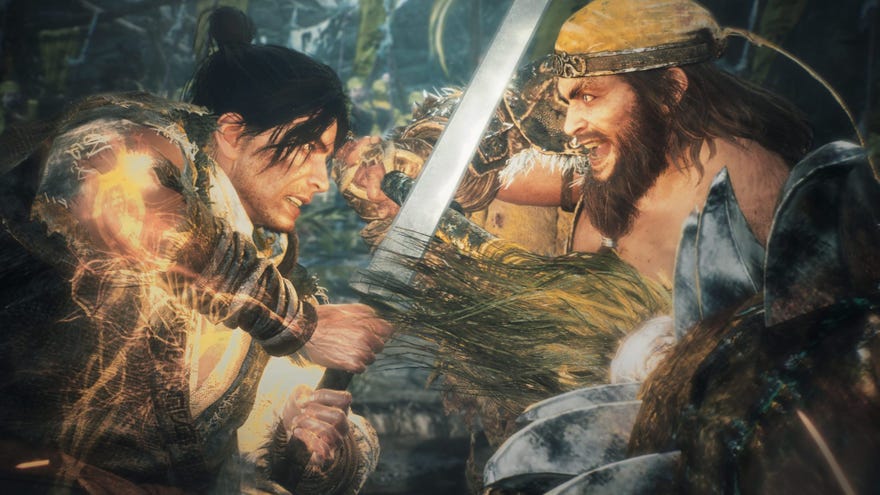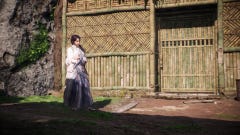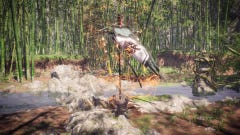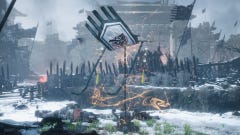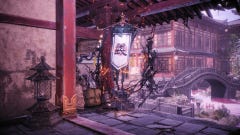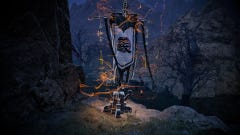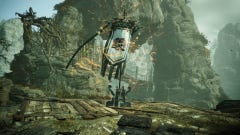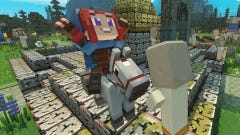Wo Long: Fallen Dynasty review: a streamlined Nioh with an encouraging spirit
Team Ninja's most approachable Soulslike yet
It's easy to label Wo Long: Fallen Dynasty as a Soulslike that's basically Nioh and Sekiro mashed together. To some extent, that's true. But I think Wo Long is Team Ninja having sanded off some - not all - of the edges from the overwhelmingly complex Nioh, to craft an action RPG with even crisper combat than its predecessor. And crucially, it's more approachable as a result. Clever ranks and meters reward, whether risk-taking is your jam or you're more of a careful type. It may still be a tricky venture filled with demonic, titanic cows that'll want to pound your skull into the dirt, but this is Team Ninja's most encouraging effort yet.
Nioh and its sequel are set in a feudal Japan where important historic figures fight over crystals, as these crystals are sparkly and have powers. However! They also have the power to corrupt, turning your shoguns and wizards into bloated demons and gangly harpies. The story is, err... certainly present. And Wo Long is no different, in fact, it's largely the same. Replace feudal Japan with Han Dynasty China, then swap out sparkly crystals for sparkly balls. You there in the back, what effect do you think the sparkly balls have on the game's plentiful historic figures? That's correct, they are corrupted and turned into frothing fiends. Chances are you won't care for any of the story, really. And it's a shame that Team Ninja haven't taken the opportunity to twist Wo Long's tale into something at least a little different to Nioh's. But then again, when the combat is so satisfying, it's all forgiven once you enter battle.
Again, if you're a Nioh fan, entering battle will feel familiar. Instead of one big open world that you'll gradually unfurl ala FromSoftware games, Wo Long opts for separate missions that you'll choose from a map menu. Eventually you'll unlock "sub missions" that reuse and remix portions of older levels to create tighter, sometimes trickier scenarios. Aside from sating the completionists among us, these are ways to bolster your level, get loot, and become more powerful.
In a way then, Wo Long has all the hallmarks of a Soulslike: you harvest Qi (souls) from tough enemies and move between checkpoints until you reach a boss. But it's coupled with a more traditional outlook, where missions are self-contained, labelled things that you're able to scroll through and tick off. And I reckon it works far better here than Nioh, where powering up your character is layered in – later on, at least – a thick grind and a dizzyingly complex web of menus and percentages. Wo Long untangles a lot of Nioh's woes, streamlining things to make the act of ticking off missions not only a joy, but a joy that doesn't threaten entire brain collapse.
"The age of mana is over, sorry"
Wo Long's combat isn't just a joy, it's sensational. And in a typical Team Ninja sort of way, it's not just in how weighty it feels, but in the various systems that grant it weight without making it sag. Nioh's fights are sharp and jagged, with fights that feel like you're jolting your character left and right and diagonally, as if they're on a chessboard. Wo Long rounds off these edges and takes clear cues from Sekiro, where rhythmic parries transport you from the chessboard to the bullring. You don't jolt to and fro, you wait for a flash of red and - "schiiinnnnggg!" - deflect with a flourish.
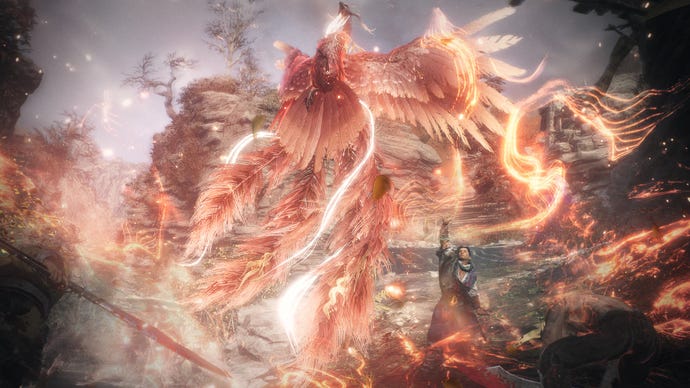
Mix in some swipes with your perfect parries and you might break an enemy's Spirit Meter (poise), letting you pull off a flashy finisher. Aggression is rewarded handsomely, but only if you're able to balance your very own Spirit Meter, too. It's basically a stamina bar split into two halves. Each time you dodge, parry, or use Martial Arts (special moves tied to weapons), you'll enter the negative. Get smacked when it's maxed out and you'll be left gasping and vulnerable for a bit. If you're the one to land your hits successfully, though, the negative will flip over to positive.
And a positive Spirit meter is as azure and revitalising as a blueberry Slush Puppie, granting you the power to unleash Martial Arts or Wizardry Spells on your poor victims. The more aggressive you are, the more powerful you'll become in a fight. And in the grizzliest of fights, it's immensely satisfying when a risk pays dividends, and your surplus of blueberry fuels a flurry of swings and spells. If you were to slide Mana or Spirit in front of me, I'd choose Spirit every time. Then boot Mana into the sun. The age of Mana is over, sorry.
It's clear that Team Ninja have thought of ways to enhance your usual bash through a mission. Morale Rank is the jewel in the proverbial Slush Puppie lid, which gives everyone, including yourself, a number that sits atop their head. At the start of each mission you'll start at rank zero, with the maximum being 25. To up your rank, you'll need to slay enemies and – ideally – avoid death. If you take on an enemy with a much higher rank than you, then there's a chance you'll be squished in seconds. Although, if you manage to beat them, you'll receive much greater loot drops. Risk and reward tussle once again.
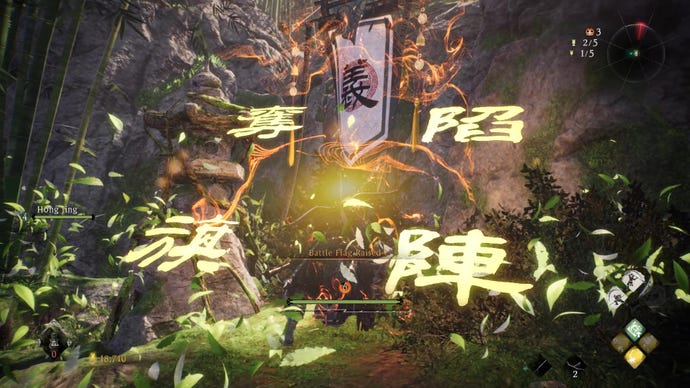
What Morale Rank does is add a couple of extra layers to each level. At a glance, you're able to see how an enemy might stack up against you, and whether you're willing to take a risk. But crucially, it rewards you for not taking chances, instead encouraging you to explore, defeat some more enemies, up your rank, and make a triumphant return to the gigantic ape that's snoozing in the trees. Having the option to up your Morale Rank is one thing that makes Wo Long more forgiving than Nioh and possibly Sekiro too. This isn't to say Wo Long isn't difficult – it is. But as someone who's been smushed to a pulp in Nioh and rocked myself to sleep after falling to Sekiro's Lady Butterfly for the umpteenth time, I reckon Wo Long's difficulty hits the sweet spot.
Barriers have been levelled by levelling, as well. You pour Qi into one of five elements, occasionally getting points you can spend across a wide range of spells. While it's far from perfect, with the same obtuse energy as Dark Souls and Nioh, where putting points into vague words like "Mind" feels like popping a diamond into a coin pusher at an arcade, it's a lot more generous in the way of health and damage bumps. Then you've got a wide range of weapons and mwah, they are delightful. Scimitars. Massive hammers with spikes on them. Halberds. Dual swords. Honkin' great axes. All complete with their own special moves and Team Ninja's ability to make any and all of their combos downright beautiful. It feels like every playstyle is catered for here.
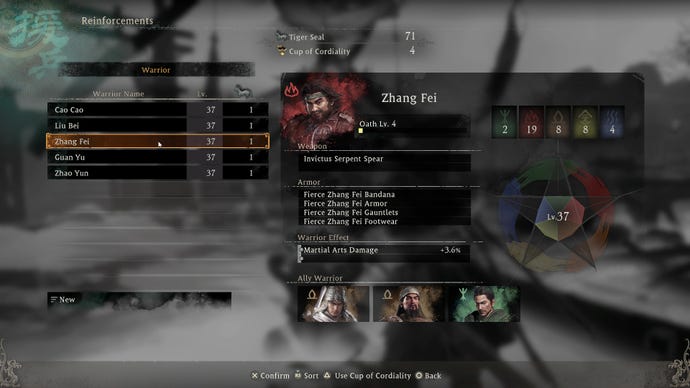
I will say, though, that Wo Long doesn't untangle all of Nioh's worst offenders. While, yes, it streamlines a lot of the faff, its finicky approach to loot and stats is both wonderfully deep if you're into the minutae and deeply unpleasant if even just the mention of "minutae" makes you retch. You won't find loot streaming out of chests in a rainbow-coloured arc, anymore. So that's good! But your inventory is still cursed to contain a vast array of grey and blue and purple gear, each complete with their own icons and percentiles. A button press can explain each tiny detail to you, yet it can detract from the upgrade process (there's a blacksmith) when gear's so expendable. Why bother investing in a sword when you know twenty better options are due to spring up in the next hour?
I'm in two minds about the game's missions too, as they build on Nioh and fall victim to the same level of fatigue. There's a jump button now (cheers Sekiro), which lets you scale up ramparts and into spots where you can plunge down onto demons. Hops add some much-needed dynamism to levels previously bottlenecked by ladders and locked doors. Finally, you're able to bounce your way to discovery. Then again, because the levels are largely linear efforts with optional paths, fatigue can set in, both if you're butting your head up against a slobbering devil, and from the game's tendency to follow a tried and tested layout. Bamboo forests, snow-covered peaks, dingy dungeons, all of them certainly look the part, but can follow too predictable a pattern at times.
So then, Wo Long: Fallen Dynasty may fall victim to the same pitfalls that snared its predecessor Nioh. Looting and levelling can be an overwhelming and confusing venture, to the point where it can be actively offputting for those who want to know, at a glance, that the greaves they're rocking and the spells they're casting are the best for their character. And yet, if you embrace the slight messiness of the game's backend, what you've got is a triumphant Soulslike and a showcase of Team Ninja's ability to make some of the best combat in action-RPGs. It's a streamlined Nioh, one with rhythmic action that may not always reward your efforts, but is rewarding in and of itself. And that's what will keep you coming back.
